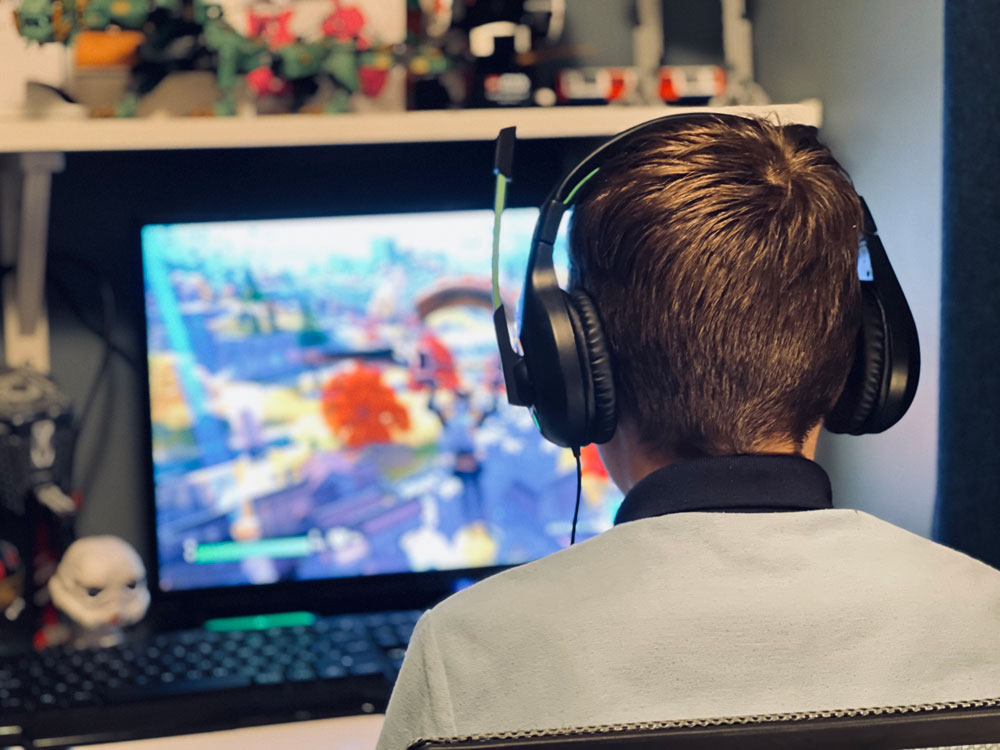On 7th February, internet users worldwide will recognise 'Safer Internet Day', helping to make the Internet a better place for children and young people. With that in mind, Eyeweb's Social Media and Content Executive, Mark, is looking at internet safety for children.
As a father of two children aged 13 and 10, their safety is obviously my primary concern. As they have got older, they've started showing more interest in computer games and online activities.
Schools have been using more technical ways of delivering lessons for a long time, but this increased when the Coronavirus pandemic hit and the global landscape changed dramatically. Children across the country were being schooled at home, via Zoom or Teams, and needed access to the Internet more than ever. For some children, this was their first experience with the Internet.
Many schools deliver internet safety lessons in classrooms, but we, as parents, also have a massive responsibility to teach our children how to remain safe whilst online.
When the world wide web first entered our homes, monitoring and restricting internet access was much easier. Only a few homes had a home computer; it was a bulky piece of equipment and was physically connected to your phone line. Connecting via your modem took a long time and would take up your phone line. Heaven forbid if your brother or sister wanted to call their mates to make arrangements to go out!
Now we have a whole host of devices to take into consideration.
Smartphones
Laptops
Tablets
Games Consoles
Smart TVs
Smart Speakers

With the speed of technological progression, it is understandable that this can be a minefield for parents who didn't have the same experiences to deal with when they were growing up.
The head of Samsung UK, James Kitto, recently told the BBC that he didn’t give his daughter a mobile phone until she was 11, although he acknowledged that this is a parental decision. His comments came after Ofsted’s chief inspector said she was “surprised” when primary school children have their own smartphones.
James Kitto went on to say, “whatever age you make that choice for your child, it is important to ensure that, if they are accessing the internet, they are accessing it in a safe way.”
2023's Safer Internet Day theme is 'Want to talk about it? Making space for conversations about life online'. Here are some hints and tips to protect your children as they begin and continue their online journey.
Talk – The first step is to help our children understand the dangers of an online space. Also, discuss what they enjoy doing online and ask them to show you the apps and websites they like visiting.
Play together - Playing games with them is a great bonding experience whilst also ensuring that you know the activity is safe for them.
Stanger Danger – Just as we were taught not to speak to strangers on the street, the same is just as important when your children are online. Advise your children what to do if someone they don't know starts a conversation with them. We have an agreement that our children are to ignore any conversations from people they don't know and let us know immediately. They only play online with school friends, and we find out their friends' usernames to make sure that they are speaking to who they think they are.
Be available – if your child sees something they shouldn't, or a stranger tries to talk to them, make sure that they are able to let you know without risk of punishment. It also makes sense to periodically check in on your kids whilst they are online.
Access Restrictions – Apple has a great feature called "Family Sharing", which means I can restrict access to their Apple devices from the settings on my iPhone. This allows me to
restrict which websites they can access on their phones or iPads.
restrict all access during certain times of the day or for a length of time
they have to ask when downloading apps, meaning that I can check if the apps they are downloading are appropriate... and they are only spending my money with my knowledge and consent!
Similar restriction features are available on Google for those of you who use Android.
Access restrictions generally only take a few minutes to set up, but it is well worth your time. Using these facilities can ensure that your children cannot visit unsuitable sites and chatrooms.
Don't share – we’ve spent most of our children’s early years teaching them to share, but not in this case! Explain to your children that they should never share personal information like passwords, names, addresses or even their school's name. I have also explained the importance of not sharing photos with anyone they don't know.

We have all seen how the Internet can be a dangerous place, even for adults, so it stands to reason that these pitfalls can affect our children. However, as with anything, if handled correctly, the Internet is an incredible place and can support our education and leisure time.
The Internet is a fast-changing environment with developments happening every day, and it can feel daunting trying to keep up. However, we found plenty of resources available online to help teach our children how to stay safe.
A recent study by Childwise suggests that three-quarters of nine and ten year olds have access to a mobile phone and out of those, 60% have their own mobile phone with 14% using the phone of a family member. This does not consider the number of children spending time online using other devices.
There is lots of advice available on the Safer Internet Day website, but I would advise that the first step is to speak to your children and find out what they understand about the Internet; this will help shape your ongoing experiences together.


